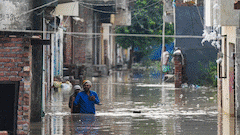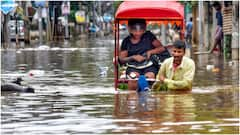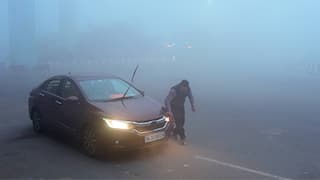Tejashwi Yadav Targets Nitish Govt Over Death Of Students, Teachers In Bihar
Tejasvi Yadav said that it was the stubbornness of the NDA government in keeping schools open even in severe heat has caused the deaths of students and teachers.

Rashtriya Janta Dal (RJD) leader Tejasvi Yadav has hit out at the NDA government as reports of teachers' and students' deaths due to extreme heat have emerged. In a series of posts in X, Yadav has shared news about 55 people which included students and teachers who have died due to the heatwave in Bihar. He has blamed the Nitish Kumar government for their decision to make it mandatory for teachers to come to school.
बिहार में NDA सरकार की हठधर्मिता के कारण भीषण गर्मी में विद्यालय खोलने से छात्र-छात्राओं और शिक्षकों की मौत की खबर है।
— Tejashwi Yadav (@yadavtejashwi) May 31, 2024
विपक्ष के दबाव में एक दिन पहले स्कूल बंद किए लेकिन फिर भी इस जानलेवा गर्मी में शिक्षकों को स्कूल आने के कड़े निर्देश दिए गए है। जब छात्र ही स्कूल में नहीं…
“The stubbornness of the NDA government in keeping schools open even in severe heat has caused the deaths of students and teachers. Under the pressure of the opposition they had shut schools for one day but they still gave strict instructions to teachers to come to school. What are teachers going to do when there are no students in the school? Teachers must be given a leave in this scorching heat.Why is the NDA government in Bihar taking such inhumane decisions towards teachers? Why is the entire cabinet including the Chief Minister resting in air-conditioned rooms intent on taking the lives of teachers?” said Yadav in the post.
बिहार में भीषण गर्मी और लू से हुई 55 से अधिक मौतों पर गहरी शोक संवेदना व्यक्त करता हूँ। मृतकों में छात्र-छात्राएं, शिक्षक, आमजन और मतदानकर्मी है। भावपूर्ण श्रद्धांजलि! ईश्वर से प्रार्थना है कि दिवंगत आत्माओं को शांति प्रदान करें! pic.twitter.com/CfO3A66DNA
— Tejashwi Yadav (@yadavtejashwi) May 31, 2024
He also offered condolences to the people who lost their lives due to the extreme heat in the state. Yadav’s tweets come after reports of deaths due to heatstroke have come out of the Eastern states of Bihar and Odisha.
Odisha & Bihar Heatstroke Deaths
Officials said on Friday, that in the last 24 hours, at least 18 people, including 10 polling personnel, have succumbed to heatstroke in the eastern states of Bihar and Jharkhand, as per a PTI report. While 14 fatalities were recorded in Bihar, four were reported from neighbouring Jharkhand, they added.
The Odisha government confirmed five deaths due to sunstroke over the past few days, with investigations ongoing into 18 suspected cases, PTI reported.
A report by Reuters stated that around 15 people have died of suspected heatstroke. The report said that the deaths of 10 people in the government hospital in Odisha's Rourkela region on Thursday and 5 people in Bihar's Aurangabad city were reported as due to ‘sunstroke’.
"About seven more people died on their way to the hospital yesterday but the exact cause of their death will be known after the autopsy," Aurangabad District Collector Shrikant Shastree said in the report.
Most of Northern and Eastern India is reeling under a severe heatwave with temperatures in parts of the capital city Delhi, recording 52.9 degrees Celsius although the IMD is considering it as an anomaly and is in the process of checking the sensors.
In Odisha, temperatures are going beyond 44 degrees Celsius in at least 12 locations on Thursday. Temperatures in several districts of Odisha, such as Jharsuguda, Bolangir, Bargarh, Sambalpur, Sonepur, Malkangiri, Sundargarh, Nuapada, and Kandhamal, are reeling under the heatwave. Jharsuguda reached 47 degrees Celsius.
How Is Heatwave Leading To Death?
Severe heat can overwhelm the human body’s natural cooling processes and lead to heat-related illnesses. To cool the body, two mechanisms are utilised- vasodilation and sweating. Where vasodilation allows blood vessels near the skin's surface to widen, facilitating heat loss, sweating cools the body as the sweat evaporates. Environmental factors such as high temperatures, humidity, low wind, and high thermal radiation can affect the body’s mechanism to regulate internal temperatures causing it to rise to higher temperatures. This can impact body functions and can even cause damage to the brain.






































